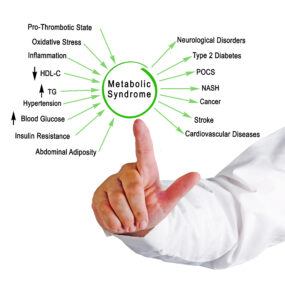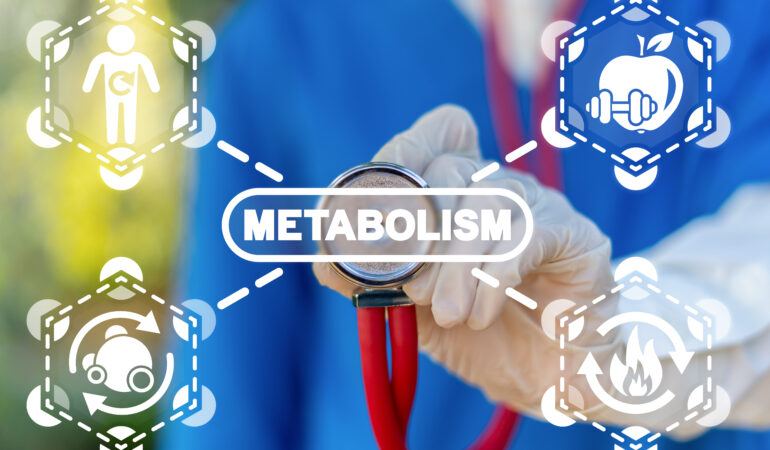Introduction
 Ah! Who would have told me a few years ago that my main problem in adulthood was going to be my metabolism! I dare to believe that it all started due to a drastic change in my thirties diet. In 2003, I came to this beautiful country for my residency program in international health. Until then, my eating habits were the same as for any person living in Cuba, high carbohydrate, low protein, and low fats.
Ah! Who would have told me a few years ago that my main problem in adulthood was going to be my metabolism! I dare to believe that it all started due to a drastic change in my thirties diet. In 2003, I came to this beautiful country for my residency program in international health. Until then, my eating habits were the same as for any person living in Cuba, high carbohydrate, low protein, and low fats.
You can imagine what a significant change for my body; out of a sudden, I was eating a lot of proteins, carbohydrates, and fats without any control. In my mind, I was happy that finally, I could have all the ice cream I wanted. There was no time to think about the long-term damage but about satisfying my sweet tooth. The result? More than 40 pounds weight gain in just a few months.
Then, anxiety, depression, and guilty feelings made their debut. I tried to get back, but my sweet tooth demanded more; I dealt with a sugar addiction rooted in my childhood. I tried all diets, including the Atkins, the hype at that time. I was on the high protein, zero carbs, and some vegetables; but failed to understand the mechanisms behind that diet.
I did lose some weight, and it gave me hope; but, the sweet tooth was still there.
Why am I sharing this story?
Because it is the same story of many other people who come from a developing country where what we consume is prepared at home, most of the products come from small family farms and not from large processing industries.
As we emigrate, we face the most extraordinary diversity of consumer products in the world. There is no way to prepare for not becoming a binge consumer of fancy foods. All this harms our metabolism.
You or someone you know likely has metabolic syndrome. It is a generalized group of conditions that affects one in four people. Metabolic syndrome refers to a group of risk factors that increase heart attacks, diabetes, and other severe conditions. The first causes of metabolic syndrome are obesity and inactivity.

Since it is a relatively new diagnosis, many are not yet familiar with metabolic syndrome. The good news is that lifestyle changes are often an effective treatment. Learn how to protect yourself and your family from this health problem.
What do you need to know about metabolic syndrome?
1. Understand the five factors. Being diagnosed with metabolic syndrome means having at least 3 of the five known risk factors. These include excess belly fat, high blood pressure, and high blood sugar. The other two components are unhealthy cholesterol, high triglycerides, low HDL levels, or “good” cholesterol.
2. Look at the big picture. Some experts disagree on whether metabolic syndrome accurately predicts heart conditions and diabetes. Just remember that the five risk factors are essential and can usually be controlled by eating better and exercising more.
3. Assess your risk. Obesity, low diet, and sedentary lifestyles top the list of factors that predispose you to metabolic syndrome. The condition is also more common among older people and certain ethnic groups, including African Americans, Hispanics, and Asians.
4. Know your family medical history. Metabolic syndrome is inherited. Talk to your doctor about related conditions that affect you and your family members. Especially relevant are diabetes, insulin resistance, hormonal imbalances, heart conditions, and blood clotting problems.
Prevention and management of the metabolic syndrome
1. Request for diagnosis. Since most of the metabolic syndrome symptoms are invisible, it is essential to receive regular medical check-ups. Simple tests can measure your blood pressure, blood sugar, and cholesterol.
2. Eat sensibly. Diet plays an important role. Try to fill at least half of your plate with vegetables and fruits. Whole grains and lean proteins, such as beans and fish, are also acceptable. Ask your doctor for a referral to a registered dietitian if you are interested in a particular eating plan for diabetes or other conditions.
3. Lose weight. Even a small weight loss can have powerful effects. A 10% decrease in body weight may be enough to lower blood pressure, control blood sugar, and normalize cholesterol levels.
4. Choose healthy fats. The final item in your diet is fat. Your doctor can advise you if it is advisable to stay below the usual guidelines of getting 25-30% of your calories from fat. Whatever the number, focus on monounsaturated sources like olive oil, nuts, and seeds.
5. Exercise regularly. Being active is also essential. Work your way up to moderately strenuous exercise for 30 to 60 minutes per day. A gentle hike is a great way to start.
6. Stop smoking. Regardless of whether you have metabolic syndrome, avoiding tobacco products is suitable for your cardiovascular system. It often takes several attempts to quit smoking permanently. Give yourself as many opportunities as you need.
7. Take medication as prescribed. Your doctor can recommend medications and supplements. Ask your doctor, follow the advice and complete the prescribed treatment. There are very effective medications, including prescriptions for blood pressure and diabetes and low-dose aspirin.
Conclusions
You may be one of the 47 million Americans with metabolic syndrome, but simple changes in behavior can dramatically reduce your risks. Talk to your doctor about the best strategies for you. Controlling your weight and keeping your heart healthy will help you live a long and active life.








This is very interesting as I have never heard of metabolic syndrome.
However, I think that your post makes it very clear that if we change our life styles and eat healthy and get regular exercise, then we don’t really need to worry about it, as we will greatly reduce the chances of getting it in the first place.
Thanks for sharing and hopefully people will take heed and change their lifestyles before it is too late.
Indeed, Geoff! Thanks again for commenting. Lifestyle determines how our health is affected; choosing a healthy one ensures our body performs better.
Thank you so very much for this informative article! I did not realize how much of an issue Metabolic Syndrome could be, and after reading this, I wonder if I have an issue like this. I understand that getting it diagnosed is important, but I am in the U.S. military, and we workout every day. My diet is poor though, and I am overweight and had two other issues of the five you mentioned. Should I get that checked out?
Hello, Jessie,
Hello,
Thanks for your comment. Hey, remember that everything you feel is not right is nothing but your own body sending you a help message. Listening to your body is of the utmost importance to act promptly and regain your health and energy. Therefore, I think you should check yourself; Anything that results will be for your benefit.
To your health!
Dr. A. Gala